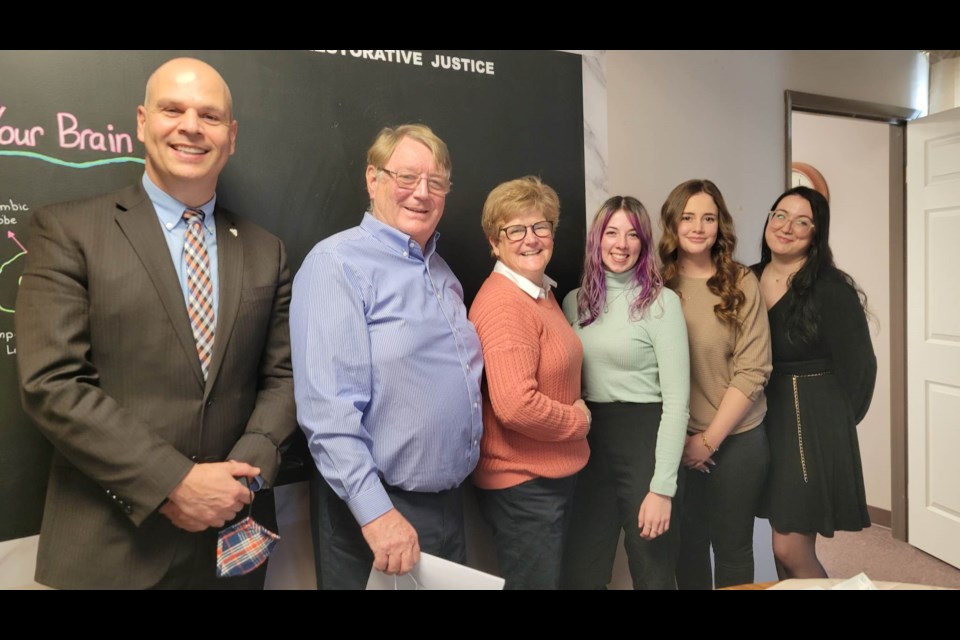Jackie Balleny said that in her time with the Sudbury District Restorative Justice (SDRJ), she has seen a crisis form.
At a Jan. 27 event discussing the work they have done with a 2022 grant, staff spoke to Sudbury MPP Jamie West at their office, located at 238 Elm Street.
Balleny is the executive director. A former educator and school administrator, she’s said that the last two years have had a significant effect on youth. “We have a crisis coming out of the pandemic for youth and mental health, and youth getting themselves into some trouble with the law,” she said.
Balleny said her first order of business upon joining in 2020 was finding out how the SDRJ could meet those needs, and she got down to writing - grants that is. The Ontario Trillium Foundation heard the call and approved a $65,200 grant from their Resilient Communities Fund, designed to help community-based organizations recover from the effects of the pandemic.
Those funds have been used to implement new programming for local youth who have become involved with the justice system, and allowed the SDRJ to hire additional staff including a full-time program coordinator, a French language program facilitator, and a communications coordinator.
During the event, Sudbury MPP Jamie West and Myles MacLeod, an Ontario Trillium Foundation (OTF) volunteer, heard from the staff about the true value of the grant to their operation and the people they serve.
Program co-ordinator, Pina Catalano, said the youth SDRJ works with are “actively involved in conflict.”
That can be at school, at home or with family, and with the law, she said, and that is why they have two main programs: Community mediation and conflict management.
Mediation involves conversation between the youth and the person who has been harmed.
“We give them an opportunity to reflect on one another's perspectives, and give them a chance to solve the conflict together with the help of our mediation, so that we can direct the conversation to a healthy solution,” said Catalano.
Conflict management teaches youth to solve the situations they encounter each day in a healthy way.
“When a youth is involved with one conflict, let's say a law conflict, they're often involved with conflict at home, and conflict at the schools,” she said, and described the six-week program available to youth to help them deal with “cognitive distortions.”
Cognitive distortions, a distortion in thinking, is most often the result of trauma.
Catalano said that “90 per cent of youth who are in the justice system have experienced trauma in their life.'' This can remove their ability to self-regulate emotions and to build healthy relationships, she said.
As trauma can have physiological effects on cognitive processing, and so after a lesson on how brains work, the focus becomes, ‘how do I make it work for me?’
Essentially, catch it, check it, and change it.
“First, we learn our triggers for the cognitive distortion, how we feel and the symptoms of it,” said Catalano. “Then we learn to change the behavior, accept that the brain is telling you things based on feelings, which you are allowed to have,” she said.
The question then becomes, “how do I address those feelings in a way that doesn't negatively affect those around me.”
The next step is SMART.
It’s about changing your thinking based on goal-setting that is Specific, Measurable, Attainable, Realistic and Timely (SMART). Taking what Catalano called “maladaptive coping mechanisms,” what the brain is currently offering as conflict management, and converting it to conflict resolution.
The youth are able to fully feel their emotions, but process the effects of those emotions in a way that is healthy for them, and for those around them.
“We want to make sure that they're expressing it in a positive manner that's going to benefit them for the future and doesn't make the conflict worse,” said Catalano.
“For nearly two decades, the Sudbury District Restorative Justice has been dedicated to building a healthy and safe community,” said West after the announcement. “Congratulations to the strong team of dedicated Sudbury District Restorative Justice staff and volunteers. This Ontario Trillium Foundation grant will enable the SDRJ to continue their important and necessary work.”
If you would like to learn more about Sudbury District Restorative Justice, visit www.sdrj.ca.
